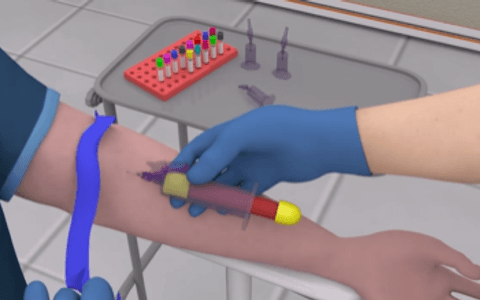Phlebotomy Technician
Apprenticeship Program
Blood and specimen collection are an essential skillset in the world of healthcare, master them in just 11 weeks. Watch our program sneak peek below!

Phlebotomy Technician
Apprenticeship Program
Blood and specimen collection are an essential skillset in the world of healthcare, master them in just 11 weeks. Watch our program sneak peek below!

This program is NOT available to residents of the following states: AR, CA, GA, LA, ND, NV, OK, PA, RI, WA, WI
Certified Phlebotomy Technician Online Training
MedCerts Tuition Advantage
We believe everyone should have access to higher education. With the option to pay in full, break down payments or utilize government grant funding, we help expand that access.
The pricing listed above for a monthly payment plan is an estimate for the cost of an 12-month payment plan including down payment. Final pricing is given at time of purchase and may vary from both pricing examples above.
*Students in Maryland are not eligible for MedCerts payment plans but may be eligible for other tuition options. Speak to an Education Consultant for further information.
The pricing listed above for a monthly payment plan is an estimate for the cost of an 12-month payment plan including down payment. Final pricing is given at time of purchase and may vary from both pricing examples above.
As a registered DoL intermediary, we're ready to answer any and all questions you have.
Certified Phlebotomy Technicians collect blood and non-blood specimens for testing, so they can be analyzed in a clinical laboratory. Specimen tests are used to diagnose illness, evaluate the effectiveness of medications and determine whether a patient is receiving proper nutrition. You may work in clinical laboratories, hospitals, community health centers, nursing homes, doctor’s offices, blood donation centers and other health care facilities.
Phlebotomy techs collect blood and non-blood specimens for testing, so that specimens can be analyzed in a clinical laboratory. Blood and non-blood tests are used to diagnose illness, evaluate the effectiveness of medications and determine whether a patient is receiving proper nutrition. They talk with patients to help them feel less nervous about having their blood drawn. Phlebotomy procedures include verifying the patient’s identity to ensure proper labeling of specimens and entry of information into a database. Keeping a clean, sanitary, and safe work environment is extremely important so they can avoid infection or contamination. Phlebotomists also assemble and maintain equipment such as needles and specimen containers.
Phlebotomists work in clinical laboratories, hospitals, community health centers, nursing homes, doctor’s offices, blood donation centers and other health care facilities. They are usually supervised by a clinical laboratory technologist or other medical professional. In medical and diagnostic laboratories, patient interaction is sometimes only with the phlebotomist. This allows a unique opportunity to positively impact patient experience.
The Registered Apprenticeship program is comprised of MedCerts online training programs as well as 2000 hours of on the job training with a sponsoring employer. MedCerts Apprenticeship programs combine class training and “on the job training” to provide individuals the opportunity to apply the knowledge and skills learned with an employer to quickly become a strong contributor in the workplace.

*The cost of all materials needed for this program are covered by MedCerts. They are not included in the tuition costs and the student is not liable for any costs or fees related to the above materials.
| Code | Course | Duration |
|---|---|---|
| PS 1011 | 2 Weeks | |
| HI 1014A | 15 Weeks | |
| HI 6011A | 35 Weeks | |
| Total Program Duration | 52 Weeks | |
Phlebotomy Technician
Job Opportunities